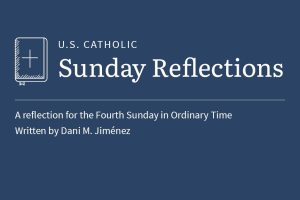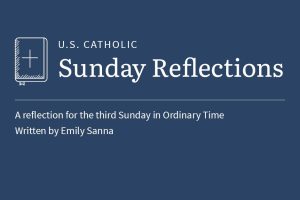Readings (Year C):
Ecclesiastes 1:2; 2:21 – 23
Psalm 90:3 – 4, 5 – 6, 12 – 13, 14 and 17
Colossians 3:1 – 5, 9 – 11
Luke 12:13 – 21
Reflection: Life is about solidarity, not possessions
Today’s gospel has a particular challenge for our times. Many of us may hear it as a warning for those who recently passed a spending bill that takes from the poorest and most vulnerable to further enrich those who already have much more than they need, and that dramatically increases funding for attempts to purge undocumented people and those in the process of seeking citizenship from our country. We hear vindication in Jesus’ warning that the rich person who delights in the accumulation of goods will lose their life very soon. Vanity of vanities, indeed.
However, in recent readings of this gospel, I have focused less on the condemnation of the wealthy landowner’s greed than on what Jesus says earlier in the passage. In response to the question posed by someone having an inheritance dispute with a sibling, Jesus warns, “Take care to guard against all greed, for though one may be rich, one’s life does not consist of possessions.” One’s life does not consist of possessions.
I have come to hear this warning from Jesus as an echo of one of the first divine utterances about humanity. In Genesis 2, the creator declares, “it is not good for the human to be alone.” The goodness of the earth was not complete until humans had companionship, community. Throughout Jesus’ ministry, he continually heals people whose condition meant isolation and calls those at the margins into the heart of the community. I think that the real meaning of this passage is to awaken us to the ways that our focus on ensuring that we and our family have enough causes division among the people of God, all the residents of the world we’ve been called to steward.
How are we to live Jesus’ warning that life is not about possessions but about community in our world and our church in these times? I believe we are called to deep resistance against the normalization of division, and the limits being placed on expansive community across our country and in the community of faith. We must stand in active solidarity with migrants, people with black and brown skin, with accents and without citizenship, with those whose access to medical care, education, or employment is being threatened, with transgender, gay, and queer people, with all whose human dignity is being denied.
As followers of Christ, we are called to risk our comfort and security on behalf of any member of our community, any member of the body of Christ, who is besieged by civil or religious authorities. No person is expendable, no person is illegal, no person is intrinsically evil.
As we continue through times that are anything but ordinary, let us live ever more intentionally into the mandate that our lives consist not of possessions, but of deep, inclusive, and faithful community. Let us realize that being followers of Christ means we must stand against profound cultural emphasis on security, and take the risks involved with prioritizing community.













Add comment